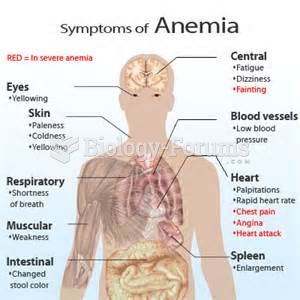|
|
|
Medication errors are more common among seriously ill patients than with those with minor conditions.
Before a vaccine is licensed in the USA, the Food and Drug Administration (FDA) reviews it for safety and effectiveness. The CDC then reviews all studies again, as well as the American Academy of Pediatrics and the American Academy of Family Physicians. Every lot of vaccine is tested before administration to the public, and the FDA regularly inspects vaccine manufacturers' facilities.
The Babylonians wrote numbers in a system that used 60 as the base value rather than the number 10. They did not have a symbol for "zero."
Patients who have been on total parenteral nutrition for more than a few days may need to have foods gradually reintroduced to give the digestive tract time to start working again.
Eating carrots will improve your eyesight. Carrots are high in vitamin A (retinol), which is essential for good vision. It can also be found in milk, cheese, egg yolks, and liver.
 Stand at the side of the table facing the head. Apply lubricant with effleurage from ankle to hip ...
Stand at the side of the table facing the head. Apply lubricant with effleurage from ankle to hip ...
 Slide along the bottom of the foot with the fist. Apply from the ball of the foot to the heel. Use ...
Slide along the bottom of the foot with the fist. Apply from the ball of the foot to the heel. Use ...





